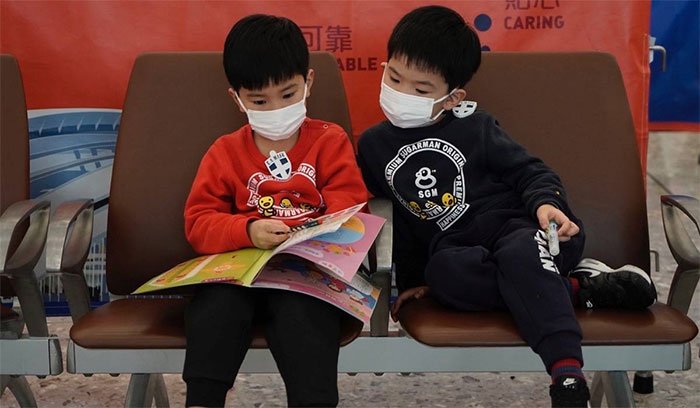Why is the nCoV virus less likely to affect children?
Perhaps due to some biological differences, children's cells are less sensitive to nCoV, making it difficult for the virus to multiply.
A study by a group of Chinese scientists published in the British New England Journal of Medicine on January 30 analyzed the characteristics of the first 425 people in Wuhan (China) infected with nCoV. Among the patients, no one under the age of 15 as of mid-January and the youngest person to die from this strain is 36 years old.
Dr. Mark Denison, a specialist in pediatric infectious diseases at Vanderbilt Medical University (USA), said the study also provides an important argument to compare with acute respiratory syndrome SARS (due to a strain). of corona virus).SARS is also a less common disease among children than adults during an outbreak in China in 2002-2003. He added that children under the age of 13 with SARS have fewer acute symptoms than the rest.

During this corona outbreak, children were less affected than adults.
Most likely, thanks to some biologically distinct characteristics , children will be less sensitive to nCoV than adults. The reason is that cells in children appear less "friendly" to the virus, making it harder for corona viruses to multiply and pass on to others, Denison said. As a result, children can become infected with the virus but will have milder symptoms than adults, meaning they may not need as much medical care as adults.
In terms of evolution, we have been exposed to some viruses since childhood. Soon, the body's immune system will recognize and become familiar with these viruses, thereby forming antibodies against the virus. Therefore, we will be able to survive better and be less trapped. However, it should be noted that this antibody cannot last forever.
Dr. Sharon Nachman, an expert in pediatric infectious diseases at Stony Brook Children's Hospital in New York (USA), said that the environment around children, including schools with lots of infectious diseases, will Helps the child's body form the immune system. Children may have encountered many corona virus strains, including some that can cause the common cold. From here, the body creates "immune cells" for children, which have immunity to the corona virus.
For example, for seasonal flu, many children in the United States get the flu virus every year, but the number of children dying from the disease is much less than it is for adults. For example, during the period 2018-2019, an estimated 7.6 million children aged 5 to 17 years had the flu, but only 211 died, accounting for 0.002%. In contrast, about 11.9 million adults aged 18 to 49 years with influenza, up to 2,450 died, accounting for 0.02%.
However, Mr. Denison also noted that the above statements are only theoretical at this time and there are currently no clear scientific studies proving that children are not infected and cannot transmit the disease. .
Therefore, habits such as washing your hands regularly, keeping your body warm, wearing a mask properly and maintaining a healthy eating habits are really necessary to protect the body from disease as well as corona virus .
- How to take care of children at home against corona virus
- Handbook for questions and answers on acute respiratory infections caused by corona virus (nCoV)
- The Ministry of Health has announced four main routes of infection of the corona virus
- How to prevent and protect young children from the risk of coronary virus infection
- Wuhan virus prevention: Dr. Pham Nguyen Quy pointed out the harmful effects when sneezing covering his nose and mouth with his hands
- The Ministry's Ministry of Health's free hotline for prevention and control of nCoV
- Ho Chi Minh City discovered 2 Chinese people infected with corona virus
- Notes on prevention and protection of Corona virus
- Detecting nCoV virus in the external environment
- Detection of 8th case of corona virus in Vietnam
- Corona virus can be transmitted from person to person within 15 minutes
- China announced three effective drugs for the new corona virus
- Where do people who show signs or infection of corona virus will be treated?
- Australia recreates Wuhan virus, a breakthrough to help develop vaccine
- Many people are confused about Wuhan virus and Corona beer
- WHO: The nCoV virus is dangerous because it has never been seen in humans
- Wuhan pneumonia resembles 70% of SARS
 Chinese doctors have created medical masks that cover only the nose for convenience of eating and drinking
Chinese doctors have created medical masks that cover only the nose for convenience of eating and drinking Scientists have found a way to help you regrow new teeth after only 2 months
Scientists have found a way to help you regrow new teeth after only 2 months Do non-stick pans cause cancer? What alternatives are there?
Do non-stick pans cause cancer? What alternatives are there? Blisters around the body: Causes, symptoms and treatment
Blisters around the body: Causes, symptoms and treatment